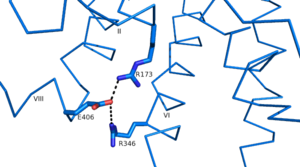We apologize for Proteopedia being slow to respond. For the past two years, a new implementation of Proteopedia has been being built. Soon, it will replace this 18-year old system. All existing content will be moved to the new system at a date that will be announced here.
Sandbox Reserved 1166
From Proteopedia
(Difference between revisions)
| Line 13: | Line 13: | ||
As opposed to class A glucagon receptors which have a proline kink, in all secretin-like class B glucagon receptors there is a Glycine at position 393 in Helix VII which allows for a <scene name='72/721537/Gly_393_helical_bend/1'>helical bend</scene>. This Glycine and therefore this helical bend is fully conserved in all secretin-like class B receptors and is an important part of the FQGxxVxxYCF motif. | As opposed to class A glucagon receptors which have a proline kink, in all secretin-like class B glucagon receptors there is a Glycine at position 393 in Helix VII which allows for a <scene name='72/721537/Gly_393_helical_bend/1'>helical bend</scene>. This Glycine and therefore this helical bend is fully conserved in all secretin-like class B receptors and is an important part of the FQGxxVxxYCF motif. | ||
| - | Another important structural component found in all secretin-like class B receptors are the two conserved | + | Another important structural component found in all secretin-like class B receptors are the two conserved salt bridges found between Arg 346 and Glu 406 and Arg 173 and Glu 406 [[Image:Salt Bridge Interactions.png | 300 px|left|thumb|Glu 406 Salt Bridges]]. |
| + | Since there is no conservation of these residues in class A receptors these salt bridges are likely an important feature of secretin-like class B receptors. | ||
Disulfide bonds | Disulfide bonds | ||
Revision as of 12:09, 29 March 2016
| This Sandbox is Reserved from Jan 11 through August 12, 2016 for use in the course CH462 Central Metabolism taught by R. Jeremy Johnson at the Butler University, Indianapolis, USA. This reservation includes Sandbox Reserved 1160 through Sandbox Reserved 1184. |
To get started:
More help: Help:Editing |
class B Human Glucagon Receptor
| |||||||||||

